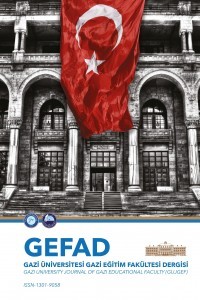Okuma yazma aktiviteleriyle dört işlem problemlerini çözmek İki matematik öğretmeninin uygulamalarındaki değişikliklerin incelenmesi
Bu durum calışması iki matematik öğretmeninin dört işlem problemlerindeki deneyimlerini; dört işlem problemleri ve okuma-yazma aktiviteleri arasındaki ilişkiyi; öğretmenlerin matematik sınıfında dört işlem problemlerine ve okuma-yazma aktivitelerine olan davranışları ve matematik sınıfındaki öğrencilerin dört işlem problemlerini daha iyi nasıl çözebileceklerini etkileyen değiskenleri tartışır. Bu durum çalışması matematik için gerekli olan anlamanın ötesinde, okuma-yazmanın dışında farklı bir aktivitenin olup olmadığını merak eder. Diğer bir değişle, çalışmanın odak noktası bir öğrencinin okuma- yazma kabiliyeti gelişirken aynı öğrencinin matematiksel okuma-yazmasının gelişip gelişmediği üzerinde olacaktır. Sonuç olarak, tartışma matematik sınıfı ve matematiksel okuma-yazma içinde okuma-yazma This case study discusses the prior experience of two mathematics teachers in solving word problems; the relationship between literacy activities and word problems; attitudes of the teachers toward the word problems and literacy activities in mathematics classroom; and variables that affect how well the students can learn to solve the word problems in mathematics classroom. This study concentrates on whether there is a different type of literacy necessary for success in mathematics beyond comprehension. In other words, the focus will be on whether a student\'s reading skill develops differently if the student is also developing a mathematical literacy. Finally, discussion will center on importance of using literacy activities in mathematics classroom and mathematical literacy.dört işlem problemleri, problem çözme, matematik,okuma yazma aktivitesiword problems, problem solving, mathematics, literacy activities Tam Metin
Anahtar Kelimeler:
dört işlem problemleri, problem çözme, matematik, okuma yazma aktivitesi
Solving Word problems with Literacy Activities Investigation of Changes in Two Mathematics Teachers Practices
This case study discusses the prior experience of two mathematics teachers in solving word problems; the relationship between literacy activities and word problems; attitudes of the teachers toward the word problems and literacy activities in mathematics classroom; and variables that affect how well the students can learn to solve the word problems in mathematics classroom. This study concentrates on whether there is a different type of literacy necessary for success in mathematics beyond comprehension. In other words, the focus will be on whether a student\'s reading skill develops differently if the student is also developing a mathematical literacy. Finally, discussion will center on importance of using literacy activities in mathematics classroom and mathematical literacy.
Keywords:
word problems, problem solving, mathematics, literacy activities,
___
- Hudson, T. (1983). Correspondences and numerical differences between disjoint sets. Child Development, 54(1), 84-90.
- Kintsch, W., & James G. G. (1985). Understanding and solving word arithmetic problems. Psychological Review, 92(1), 109-129.
- Lean, G. A., Clements, M. A., & Del Campo, G. (1990). Linguistic and pedagogical factors affecting children's understanding of arithmetic word problems: a comparative study. Educational Studies in Mathematics, 21, 165-91
- Littlefield, J., & Rieser, J. J. (1993). Semantic features of similarity and children's strategies for identifying relevant information in mathematical story problems. Cognition and Instruction, 11(2), 133-88.
- Melser, N. A., & Leitze, A. R. (1999). Connecting language arts and mathematical problem solving in the middle grades. Middle School Journal, 31(1), 48-54
- National Council of Teachers of Mathematics. (1989). Curriculum and evaluation standards for school mathematics. Reston, VA: Author.
- Okamoto, Y. (1996). Modeling children's understanding of quantitative relations in texts: A developmental perspective. Cognition and Instruction, 14(4), 409- 440.
- Reed, S. K. (1999). Word Problems: Research and curriculum reform. Mahwah, NJ: Lawrence Erlbaum Associates.
- Reusser, K. (1988). Problem solving beyond the logic of things: contextual effects on understanding and solving word problems. Instructional Science, 17(4), 309- 38
- Souviney, R. J. (1984). Working story problems. In Studies in mathematics education: The mathematical education of primary-school teachers, edited by Robert Morris, 145-151. Paris: The United Nations.
- ISSN: 1301-9058
- Yayın Aralığı: Yılda 3 Sayı
- Başlangıç: 1985
- Yayıncı: Gazi Üniversitesi
